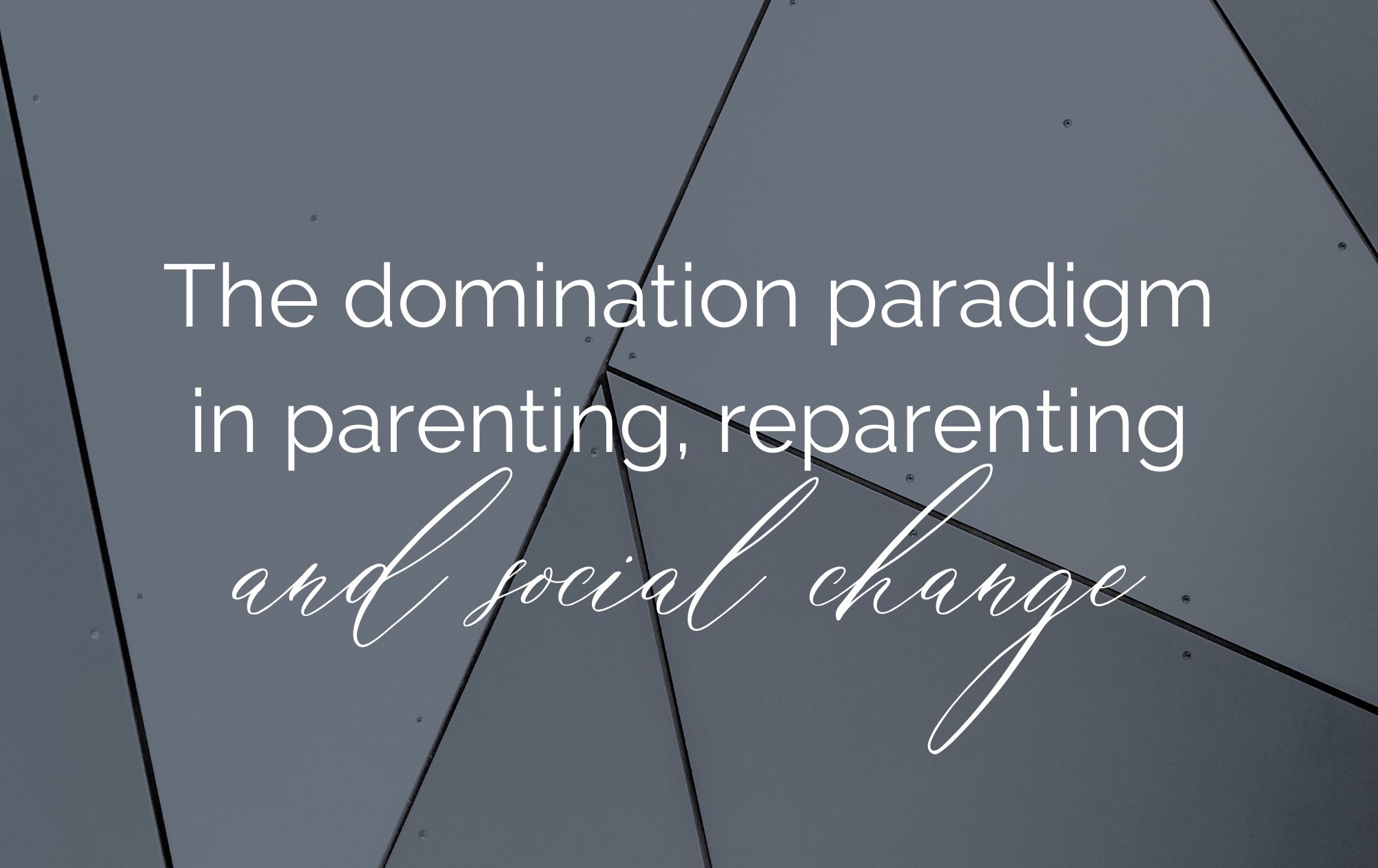You may hear me talk about Will a lot. But what is will and why is it so important in parenting, inner reparenting, life and social change?
Many of us grew up in the domination culture – which corresponds with colonised cultures, since one of the key elements of colonisation is power-over people.
Love is involved here, as it always is with will, because the origin of power-over is disconnection (a Love-Hurt). We need to be disconnected from the other to use power-over them.
So, if we grew up in the domination culture, we probably learnt, through physical or emotional coercion (should, have-to, punishment, threat, consequences) to use power-over ourselves.
You could call this internal colonisation.
In terms of will, this is when we do things like:
Ignore or over-ride our felt sense of a “no.”
Coerce ourselves to do things that we don’t want to do.
Act from guilt.
Use power-over ourselves.
Punish ourselves with self-judgment or guilt.
Parenting paradigms have, until recently, been all about power-over.
Parents and those working with children:
Ignored or over-rode children’s “no.”
Coerced children to do things that they didn’t want to do.
Used guilt to get children to act or stop a behaviour.
Used their bigger physical, emotional and economic power over children.
In the wider culture, this still happens, such as in politics, corporations, the financial and judiciary systems, and in the sense of “dominion over the earth”:
Ignoring or over-riding the “no” of others.
Coercing others;
Using guilt;
Using bigger physical, emotional or economic power.
There are all kinds of ways that we can find ourselves part of this domination system, from the most subtle to the most overt.
For example, this morning, I was hanging out with my son. We went into a shop we don’t usually go into – a newsagent – looking for a workbook. He went to the fridge and got out a ginger beer and brought it to me. I generally prefer him to have organic and low-sugar and chemical-free food and drink, but am sometimes happy to say, “yes” if he wants other things.
Yet this morning, I had a “no” in my body, but I overrode it. I paid on my card, and we walked out the door, but then the cashier called us back as the payment was taking a long time to go through. We waited. The machine stopped. I needed to use my card again. We waited and waited, and the machine kept on waiting. This seemed to be a very clear outer reflection of me saying, “yes” when it really wasn’t a “yes.” Eventually, the payment went through.
Life responds to our willingness and not-willingness. If we say, “yes” when we feel “no,” then Life will often show us that in some way or another, which might be our feelings of frustration or resentment, or it might be us coercing ourselves to take action that we’re scared of doing or don’t want to do and then the thing we’re doing doesn’t work. And our children are really in tune with when we really are willing and when we’re not, and will respond differently when we’re actually not speaking from a clear “yes” or “no.”
True willingness is a very different energy to take action from.
That’s why parenting is such a powerful part of social change.
As we increasingly:
Meet our child’s needs for choice, autonomy and agency;
Listen to and respect their “no” whenever possible;
Listen compassionately to their feelings of powerlessness, frustration or outrage when their needs for autonomy and agency aren’t met or when their “no” isn’t honoured;
Support them in differentiating their “yes” from their “no in their body sense;”
we are creating social change, because our child is more likely to treat others in power-with ways.
Accumulated feelings around powerlessness, lack of autonomy, and “no” not being honoured, is one of the key causes of aggression (and also compliance).
In children, biting, hitting, throwing and taking, are often signs of the accumulation of feelings related to Will-Hurts.
In adults, coercion, force, aggression, power-over, domination, as well as compliance and submission, are often signed of the accumulation of feelings related to Will-Hurts.
The more we do our own Will-Work, including:
Gradually changing our inner and outer self-coercion into compassion and willingness;
Honouring our needs for agency, autonomy and choice;
Listening to our feelings of powerlessness and frustration and outrage from the past and present;
and the more we support our children in staying connected to their true Will, including:
Responding to them with language and action of requesting willingness rather than coercion;
Honouring their needs for agency, autonomy and choice,
Listening to their feelings of powerlessness, frustration and outrage from the past and present;
the more we are creating social change. We are creating a new paradigm.
This also supports the paradigm to change in all the other ways we see domination systems – politics, corporations, judicial and financial systems, etc.
Our will and our willingness is our true sacred power. It’s a deeply connected power, because it comes from our own self-connection and connection with all others and the earth.
As we increasingly move away from domination and colonisation in our relationships with ourselves, our children, other beings and the planet, we create a new paradigm of power-with, of sacred power, of willingness. And that is powerful social change.
